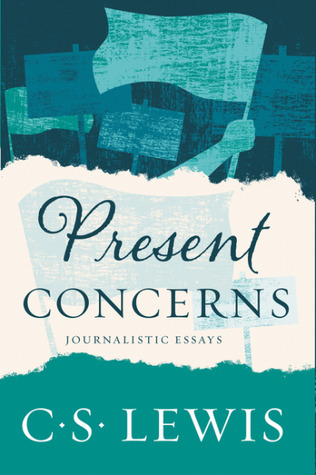C. S. Lewis wrote the essay “Modern Man and His Categories of Thought” in 1946. Now, some people, noting the date of that essay, will dismiss it immediately. After all, they might ask, “How can an essay from 1946 that talks about modern man have anything worthwhile to say to us in 2020?” That question, of course, rests on one’s definition of modern.
As a historian, I have no problem seeing 1946 as modern because I compare that date with all of human history that preceded it, which is quite a bit more than what has transpired afterward. I can also see, when I read Lewis’s essay, that what he points to is alive and well in our present day—sadly.

The essay is found in the volume Present Concerns, a title that some moderns might reject since all of the essays contained therein come from an earlier era. But that is a shortsighted perspective.
Lewis’s theme is that the Christian of the twentieth century (and we may now extend that to our new century) faces a different audience with respect to communicating the truths of the Gospel. Earlier times consisted of people who at least had some common predispositions with the Christians: they believed in the supernatural, were conscious of sin, and feared some kind of divine judgment. Modern man, in contrast, tends to debunk all three.
What particular changes in categories of thought did Lewis see? First, he notes, “it was natural to man . . . to believe that valuable truth could still be found in an ancient book. It was natural to them to reverence tradition.” Our education, he points out, no longer focuses on wisdom from the past. And if that was true of English education in the 1940s, it is certainly more true today. The effect “has been to isolate the mind in its own age.” An isolated mind? I love that description and I believe it captures the essence of so many university students that I teach. They know little of what has gone before them; they are isolated within their own limited era, one that rarely goes back to before their birth.
The mere fact that St. Paul wrote so long ago is, to a modern man, presumptive evidence against his having uttered important truths.
The tactics of the enemy in this matter are simple and can be found in any military text book. Before attacking a regiment you try, if you can, to cut it off from the regiments on each side.
Another feature of the way modern man thinks is one that fits nicely into my career: historicism. What is it? At its most fundamental level, it’s an outgrowth of Darwinianism that believes that all things have developed over time from simple to complex, and that history is following some sort of predetermined path. This if often seen in the phrase evoked by progressives who lecture people to “get on the right side of history” and who castigate those of us who don’t agree with the direction of society as being “on the wrong side of history.” As if “history” is an entity with a mind of its own and not the result of man’s choices.
Lewis explained this Darwinian developmentalism of modern man’s thought in this way:
To the modern man it seems simply natural that an ordered cosmos should emerge from chaos, that life should come out of the inanimate, reason out of instinct, civilization out of savagery, virtue out of animalism.
This idea is supported in his mind by a number of false analogies: the oak coming from the acorn, the man from the spermatozoon, the modern steamship from the primitive coracle.

Few, though, stop and think about the reverse: “every acorn was dropped by an oak, every spermatozoon derived from a man, and the first boat by something so much more complex than itself”—the mind of man. Perhaps modern man needs to rethink that assumption, Lewis argues.
Then there is what Lewis calls “Proletarianism, in its various forms ranging from strict Marxism to vague ‘democracy.'” This category of modern thought has always contained an element of antipathy toward orthodox Christianity, says Lewis. Since the people are always right, “they are convinced that whatever may be wrong with the world it cannot be themselves. Someone else must be to blame for every evil.” From this, we get a plethora of conspiracy theories.
And what about God?
When the existence of God is discussed, they by no means think of Him as their Judge. On the contrary, they are His judges. If He puts up a reasonable defence they will consider it and perhaps acquit Him. They have no feelings of fear, guilt, or awe. They think, from the very outset, of God’s duties to them, not their duties to Him.
And God’s duties to them are conceived not in terms of salvation but in purely secular terms—social security, prevention of war, a higher standard of life. “Religion” is judged exclusively by its contribution to these ends.
It’s almost as if Lewis is living in 2020 and describing our society.
This way of thinking also fits nicely with the next category: practicality. “In lecturing to popular audiences,” Lewis informs us, “I have repeatedly found it almost impossible to make them understand that I recommended Christianity because I thought its affirmations to be objectively true.” What did he discover? “They are simply not interested in the question of truth or falsehood. They only want to know if it will be comforting, or ‘inspiring,’ or socially useful.”
Relating this to the citizens of his day, he reflects, “When an Englishman says he ‘believes in’ or ‘does not believe in’ Christianity, he may not be thinking about truth at all. Very often he is only telling us whether he approves or disapproves of the Church as a social institution. . . . The popular point of view is unconsciously syncretistic: it is widely believed that ‘all religions really mean the same thing.'”
Reading this essay, I see America in 2020. We have little interest in the wisdom of the past—particularly the wisdom of Scripture—because it’s “old”; we have adopted Darwinism into our view of how society works; we think “the people,” as a whole, are always right and that God—if He exists at all—is there to meet our material needs; we have no desire to know truth, but only want our religion to be a comfort and be somehow “useful” to society.
The categories of modern thought from Lewis’s day remain our categories today.
